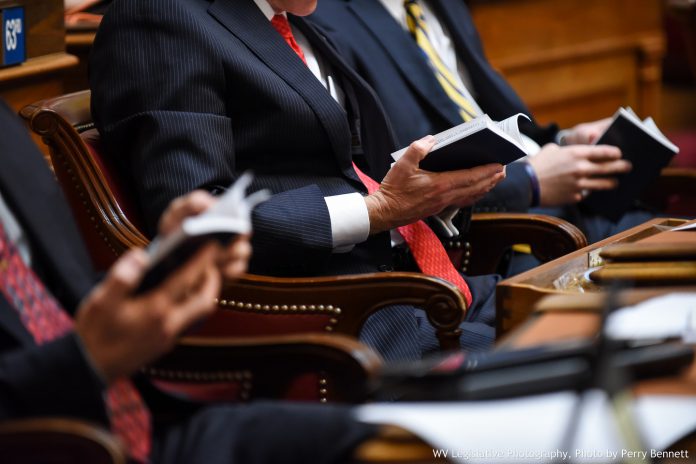
When you hear the word internship what comes to mind? Perhaps it is someone delivering multiple Starbucks orders for grande mocha latte frappe cappuccinos in the morning. A young person carrying a pile of papers from one office to another only to curse in anguish as they drop the whole stack. Or how about the classic image of someone standing over a copy machine, going through the motions for hours on end. I am going to put these myths to rest, at least for the interns who work for the West Virginia State Legislature.
Many of the interns walked through the Capitol Complex as children and were filled with a sense of awe and wonder. Personally, I had never been in a building so perfectly designed for hide-and go- seek. The marble floors made my little feet echo throughout the halls. As I looked up into the mesmerizing rotunda, I plotted out ways to design a similar sparkling chandelier for my Barbie dream house.
This year I have returned as a journalism intern for Legislative Information and sometimes I still feel like that little girl. Although the outside designs are still inspiring, I am more fascinated now at how the legislative process works from the inside. I am learning so many things as the Session goes on, and I am not alone.
Around 70 students have the opportunity to be involved with the 2009 Regular Session. Students come from universities and colleges throughout West Virginia. Our majors range from political science to public relations to international studies to psychology, while other interns are graduate students. All of us have the unique opportunity to be involved with lawmaking from start to finish.
Steven Wood, from Marshall University, appreciates the break from the collegiate classroom setting.
“I am learning about the process, not through a book, but through experience. Books can detail out a process of the steps involved in making legislation, but seeing it firsthand is different,” Wood said.
Real life experience pays off as many former interns have gone on to obtain jobs within the Legislature, state agencies and private organizations. Some students have even gone on to become Delegates and Senators. Interns are selected by the Legislative Internship Committee, which is comprised of professors, Legislative members and staff.
Many interns are shocked at how little they actually knew about the legislative process before arriving at the Capitol. Logan Gibson, from West Virginia Wesleyan College, was surprised at the amount of detailed work that goes into lawmaking.
“I never realized what an involved process it is to turn a bill into a law,” Gibson said.
Any intern might feel uneasy at first, but truthfully, the process of lawmaking is challenging for even the most experienced lawmaker. Information comes at us faster than the speed of light. Shall we open the Manual of Parliamentary Practice and convene?
Joint resolutions, concurrent resolutions, fiscal notes, summaries, bill language, speech writing, bill drafting, first, second and third readings, committee meetings, amendments, appeals, motions, adoptions, caucuses, order of business and now we adjourn…and your mind explodes.
Lindsey Strain, a senior from Marshall University, expressed the intimidation most of us felt. “I was sitting in an impressive committee room, surrounded by people who all sounded much more intelligent than me and I thought ‘Oh Dear Heaven, what have I done?’”
While the information may be overwhelming at times, we were chosen from many applicants because professionals believed we could handle the job. It is a great privilege to serve the state of West Virginia and something to be proud of.
Legislative interns have a variety of responsibilities, some of which include: researching legislation, tracking bills, attending committee meetings, writing news releases, answering constituent requests, preparing floor books, covering floor sessions, and publishing newsletters to name a few.
To have a prosperous government, it is important that everyone works as a team. From intern to staff member, to Speaker of the House to President of the Senate, success comes when people work for the common goal of making our state a better place for now and for generations to come.
Meghan Arnold, from Marshall University, compared the process of legislation to gears turning in a machine.
“If one gear is not working properly, it all gets messed up. I love how we are all working together to make West Virginia one of the best states in the nation,” Arnold said.
Although moments of intimidation are still there and lost expressions are likely painted on our faces, I will speak for my fellow interns and say we are excited and thankful for the great opportunity to work with our state leaders.
We still walk through the Capitol with the same sense of childhood awe, only this time we are young adults ready to take on the world. Members have an extraordinary responsibility to make tough decisions during these challenging days. There is no greater time to be an intern.

